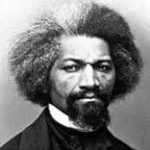Can Books Still Change the World?
 So, I’ve been reading Frederick Douglass’s autobiography. I like to keep up with the latest fads and, as President Trump pointed out recently, Douglass “is an example of somebody who’s done an amazing job that is being recognized more and more.”
So, I’ve been reading Frederick Douglass’s autobiography. I like to keep up with the latest fads and, as President Trump pointed out recently, Douglass “is an example of somebody who’s done an amazing job that is being recognized more and more.”
Douglass is probably the most famous abolitionist of all time, and his work was widely recognized in the years before, during, and long after the Civil War, including by President Abraham Lincoln, whose response to Douglass’s criticism was to invite him to the White House to talk about their differences. Over time they developed a strong friendship and at least a partial reconciliation of their views. Lincoln listened, changed, and came to appreciate Douglass, and the feeling was mutual.
Douglass, who educated himself and escaped slavery, published the first of three autobiographies in 1845. It is as powerful and upsetting today, even after we know the horrors of slavery, as it was when it was published. Much of that power comes from Douglass’s remarkable skill as an author. Consider this passage about how he felt when he was free from slavery:
“I suppose I felt as one may imagine the unarmed mariner to feel when he is rescued by a friendly man-of-war from the pursuit of a pirate. In writing to a dear friend, immediately after my arrival at New York, I said I felt like one who had escaped a den of hungry lions. This state of mind, however, very soon subsided; and I was again seized with a feeling of great insecurity and loneliness. I was yet liable to be taken back, and subjected to all the tortures of slavery. This in itself was enough to damp the ardor of my enthusiasm. But the loneliness overcame me. There I was in the midst of thousands, and yet a perfect stranger; without home and without friends, in the midst of thousands of my own brethren—children of a common Father, and yet I dared not to unfold to any one of them my sad condition. I was afraid to speak to any one for fear of speaking to the wrong one, and thereby falling into the hands of money-loving kidnappers, whose business it was to lie in wait for the panting fugitive, as the ferocious beasts of the forest lie in wait for their prey. The motto which I adopted when I started from slavery was this—‘Trust no man!’”
The passage strikes me as particularly relevant today in light of the uncertainty facing so many immigrants standing on American soil.
Douglas didn’t stop with writing three volumes of his autobiography. He was one of the effective orators ever and he even started his own newspaper. But his autobiography had had such a profound effect on American society that it was undoubtedly an obvious pick when the New York Public Library selected the “Top 25 Books That Changed History.” It’s an interesting list, ranging from the King James Bible (as well as the Koran and the Torah) to The Communist Manifesto by Karl Marx and Friedrich Engels to Upton Sinclair’s The Jungle. It also includes Silent Spring by Rachel Carson, Betty Friedan’s The Feminist Mystique, Darwin’s Origin of the Species, George Orwell’s 1984, and John Hersey’s Hiroshima.
What struck me about the list (other than that I’ve yet to read too many of the entries) was that the most recent book was Bury My Heart at Wounded Knee by Dee Alexander Brown, which was published in 1970. Perhaps there is nothing more recent because it is too soon for anything to have had such a profound effect. Or, more frighteningly, it is because books are losing their influence.
In today’s world, it is much harder for any work—novel or nonfiction—to break through and reach a mass audience, especially if the work is serious, scholarly, or high literature. The best seller lists are stacked with genre novels meant to entertain more than to enlighten. And there is so much more competition that it is harder for any book to break through unless the author is already well known.
And of course, books now must compete for the attention of a public with a shorter attention span, while readers are flooded with social media of all types, as well as movies and music readily available on demand.
I’m not suggesting that books aren’t still thriving, just that there are so many more of them and so much else that it’s harder for any single work to have a strong and lasting impression. I can’t judge whether this is good or bad (or neither), but I’d welcome your thoughts on that, as well as suggestions for what you’d put on the list of most influential books published after 1970.
Please list your suggestions in an email to mark@markwillen.com or in the comment section below.
Mark Willen
Mark Willen’s novels, Hawke’s Point, Hawke’s Return, and Hawke’s Discovery, were released by Pen-L Publishing. His short stories have appeared in Corner Club Press, The Rusty Nail. and The Boiler Review. Mark is currently working on his second novel, a thriller set in a fictional town in central Maryland. Mark also writes a blog on practical, everyday ethics, Talking Ethics.com.
- Web |
- More Posts(48)